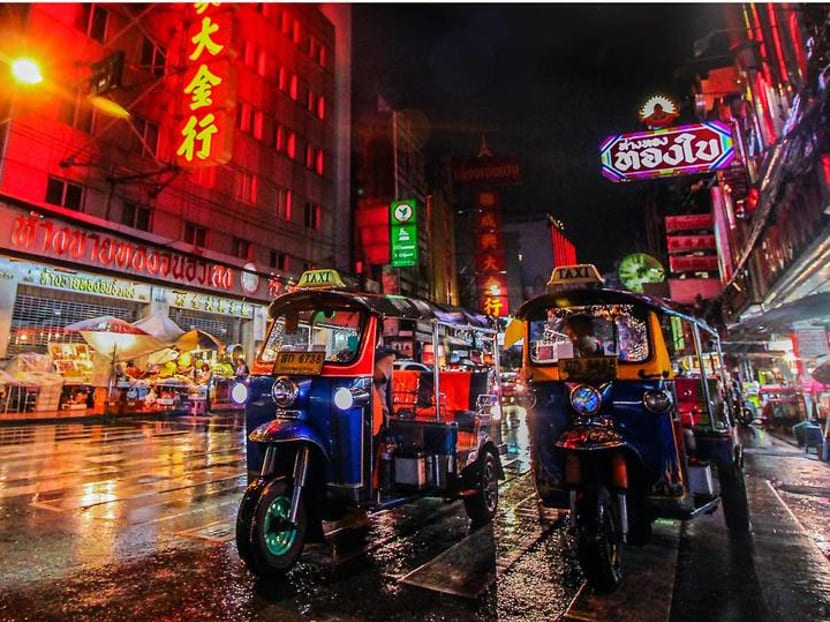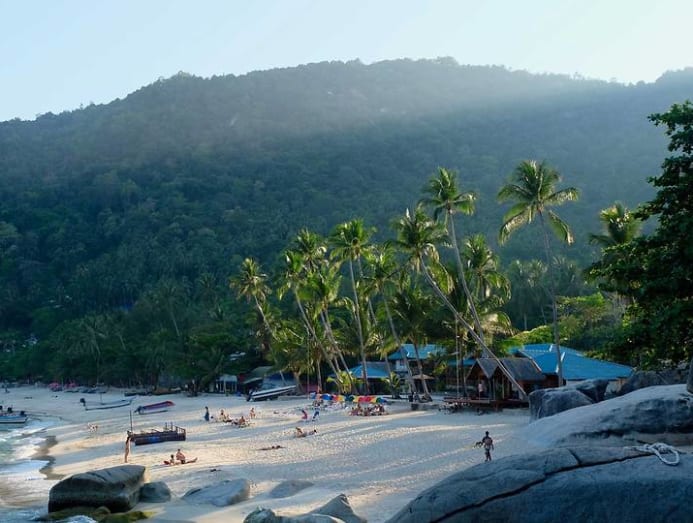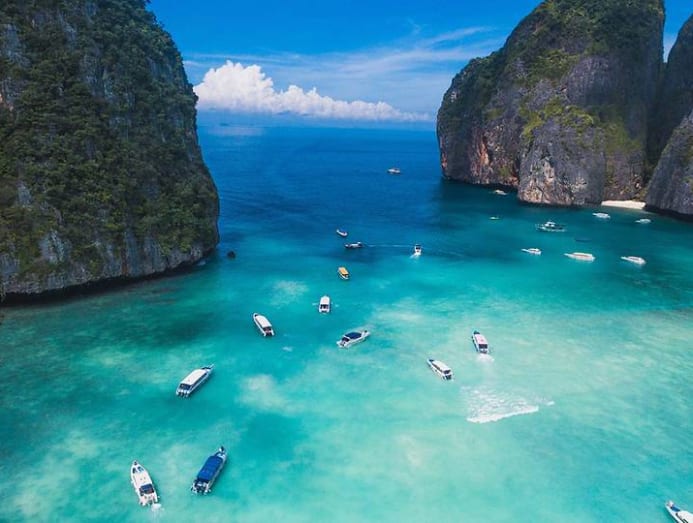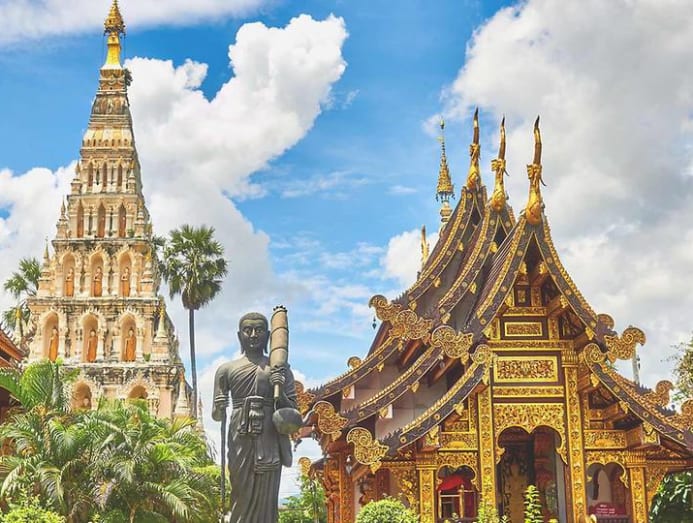As Thailand’s travel industry readies for relaunch, what can visitors expect?
Advertisement
Experiences
As Thailand's travel manufacture readies for relaunch, what can visitors expect?
Hospital-quality levels of hygiene and cleanliness, and minimised but bespoke human contact, will become not merely a feature but an integral part of the travel experience, especially at the high end.

Tuk Tuks in Bangkok'south Chinatown. (Photo: Unsplash/Florian Wehde)
At Bangkok's flower-garlanded Erawan shrine, right downstairs from my role, the female dancers who have figured in decades' worth of tourist snaps are back in activeness. They are wearing the same spired, bejewelled, golden hats just their faces are masked backside plastic shields.
But down the cake, staff at the Anantara Siam Bangkok Hotel are being trained in the deep cleaning of a hotel room, using infirmary-class disinfectants, in preparation for reopening. In the reception, plexiglass shields have been erected at the counter, chairs and tables advisedly spaced, and discreet red Xs taped on the flooring to mark the spots where guests volition expect to check in.
Thailand was the first land after China to report coronavirus cases and is among the first to be exiting lockdown. Bangkok is the world's most visited city, according to Mastercard's Global Destination Cities Index, and it is besides dwelling to international hospitality groups such as Minor Hotels (whose brands include Anantara, Tivoli, Avani and NH) and Sansiri, possessor of The Standard Hotels, known for its flagship holding straddling New York'due south High Line and its recently opened St Pancras hotel.
Every bit such, what happens in Thailand can perhaps be seen every bit a bellwether of global things to come.

READ> Postponed hymeneals, self-isolation: How Ase Wang is coping in Bangkok amid COVID-nineteen
"Before this hit, tourism was booming; it was a heaven for all nationalities – Europeans, Americans, Chinese, Indians, they all honey Thailand," said Srettha Thavisin, Sansiri's president and Standard Hotels' chairman. "When this matter is over . . . my gauge is people will feel condom to come hither again, mayhap in the third quarter, when flights return to normal."
Thailand earned a proper name and a global niche for itself with exotic, tactile experiences, from embankment raves to Chinatown street meals, Thai boxing matches, jungle treks and traditional massages. As the industry prepares to reopen, the question is whether the masks, temperature checks and abundant hand sanitiser won't be the ultimate mood killer.
Thailand hosted a record 39 million visitors last yr, only the Tourism Dominance of Thailand expects merely 16 million to come up in 2020, and many in the industry call back it will be lucky to go x meg. Hoteliers and restaurateurs insist that returning guests tin still expect the familiar pleasures, albeit with some new additions.
Contactless engineering science – cards, touch-free buttons, even facial recognition – will increasingly exist used at cheque-in, to operate lifts and open up doors or rubbish bins. Hotels' public spaces will be reconfigured or redesigned to let more ventilation and sunlight in. Breakfast buffets will mostly be replaced by table service; servers will accept their smiles hidden backside masks, and will be wearing gloves when they serve y'all your som tam (spicy papaya salad).
"A face shield, it's a designer nightmare," Thavisin said. "I'1000 banking on our corporate design staff to come upwardly with something bonny."
Paste, a Michelin-starred Bangkok restaurant, is grappling with the same issue. Plastic face shields "wait likewise much similar a spaceship", muses Bongkoch "Bee" Satongun, the eatery's chef and co-owner. "Nosotros are still debating what to exercise."
For long-booty visitors, extended stays in one place will exist more than mutual than multi-destination jaunts around Thailand and due south-eastern asia. Private villas promising socially distanced seclusion will command a bigger premium than before over high-ascension hotel rooms.

And hospital-quality levels of hygiene and cleanliness, and minimised but bespoke human contact, will go not just a characteristic but an integral part of the product, specially at the high end.
"The aforementioned level of personalisation will be in that location, only we will minimise the number of staff guests meet," said Thomas Harlander, managing manager of the luxury group Rosewood's Bangkok hotel. Like Anantara, the hotel is promising a "seamless" experience for guests from their arrival at Suvarnabhumi airport. Vehicles carrying guests will be disinfected, and a note put in the auto saying it was professionally cleaned. "It's going to be even more than seamless, and fewer people, fewer touchpoints, less intrusive," Harlander said.
Anantara is planning to offer gym services, but on an individual basis, with equipment carefully sanitised and private training sessions booked in accelerate. Room service will continue, merely servers will roll the trolleys upwardly to guests' rooms without entering themselves. "You don't want a stranger in your room," said Thomas Meier, the group'due south senior vice-president for Asia. "Nosotros will help you lot push button information technology in, and then you volition fix it up yourself."
"The same level of personalisation will exist at that place, but… information technology'due south going to exist even more seamless, and fewer people, fewer touchpoints, less intrusive." – Thomas Harlander
With the number of confirmed coronavirus cases at well-nigh iii,000 and simply 56 deaths to engagement, Thai government have been easing lockdown restrictions gradually since early May.
First some restaurants were immune to open, but with actress infinite between diners, followed past hotels in some provinces. Malls were side by side, consummate with temperature scanning robots and free confront-mask dispensers. Gradually, Bangkok, along with the rest of Thailand, is regaining some of its old buzz.
At that place is a paradox in all this. Last twelvemonth, as visitor numbers reached a historic elevation, then information technology seemed did complaints virtually overcrowding on beaches in places like Phuket and Pattaya and the long immigration queues at Bangkok'southward two airports. The Tourism Authorization of Thailand's management of the sector, which focused largely on bringing in high numbers of visitors, came under criticism as unsustainable.
Now, after 2 months of lockdown, Thai beaches are their cleanest in years and are beingness visited by otherwise seldom seen wildlife such as hornbills, pink dolphins and dugongs. In a recent call with journalists, Neb Heinecke, Minor's principal executive, marvelled at the corals now visible off Thai beaches and h2o clarity "like I've never seen earlier". "I think nosotros're going through a reset," he said.

The trouble, for hoteliers and travellers alike, is that it is not yet possible for tourists to get to well-nigh of these places. At the time of writing, domestic travel between Thai provinces remains restricted, with regulations varying by province. Most international flights are banned until May 31 and that ban may be extended.
Thai hotel groups say they expect travel to resume in three phases, starting with locals: Thais and expats who are keen to travel once more. Anantara plans to begin offering packages to places that tin can be easily reached past automobile from Bangkok, such as the beach resort Hua Hin. "You can drive to these locations and eliminate the gamble of existence on a plane," said Meier.
Thai authorities are at present likewise speaking of easing international travel, starting with Asian countries such as Cathay and South korea that take brought their coronavirus caseloads nether command. Hotel groups expect that the Chinese in item, newly freed from lockdown, will exist keen to come back.
"If they are looking to travel again, one of their kickoff destinations will be Thailand," said Suphajee Suthumpun, primary executive of Dusit International.
Dusit has 9 hotels in China and, as such, a preview of the group psychology of tourists recently freed from home quarantines. "When they lifted lockdown situations, people got excited and began to travel," Suthumpun said. "And so they realised they shouldn't do information technology so much, and became more than rational."
For its 12 Thai hotels, Dusit is preparing a "comeback campaign". Alongside the shampoo and soap offered in guest rooms, there will be a "personal protection pack" that includes hand sanitiser, a mask and gloves. At its Hua Hin and other properties, the chain will be offering guests the selection of getting local food, handicrafts or other "must-endeavour" items in their rooms via concierge service. Gyms will be moved outdoors.
The third and final phase of reopening will be long-haul flights from the United states and Europe, which hotel groups expect in the concluding part of the year.
Sansiri is doing "small to major renovations" of its two Thai hotels, opening them up to sunlight and the gardens more, and enlarging communal areas. Similar design features are being incorporated into Standard'south planned backdrop in Hua Hin, Ko Samui, Pattaya and Phuket.
"The feeling of being too close together won't exist desirable," said Thavisin. On entering hotels, guests may be given something to disinfect the soles of their feet, or an ultraviolet low-cal that "cleanses you", he said.
Hoteliers are resisting the urge to discount at a time when they face lower occupancy and higher health-and-condom related costs, simply are calculation some extra inducements to come.
In Ayutthaya, the Unesco World Heritage site a ninety-infinitesimal drive outside Bangkok, the boutique Iudia hotel is maintaining room rates but offering gratis dinners, in part because many restaurants remain airtight. The ruined city'due south awe-inspiring plazas, stupas and temples – ordinarily swamped past day-trippers from Bangkok – are at present being enjoyed by a scattering of Thai tourists, and that is unlikely to change until airlines restore more long-haul flights.

"Information technology's a golden time . . . the temples belong to you lot," said Mayuree Tantayapong, the hotel's managing director. "People who were stuck in their houses and felt lone and isolated thought that one month was enough. Now they want to exit and observe something to make them experience live again."
"When this affair is over . . . my guess is people will feel prophylactic to come hither over again, maybe in the third quarter, when flights return to normal." – Srettha Thavisin
Past John Reed © 2022 The Financial Times
READ> You lot can nonetheless travel on a 'fauxcation' – all you lot need is Photoshop and a dream
Recent Searches
Trending Topics
costellocionfibed.blogspot.com
Source: https://cnalifestyle.channelnewsasia.com/experiences/thailand-travel-industry-covid-19-251251

0 Response to "As Thailand’s travel industry readies for relaunch, what can visitors expect?"
Postar um comentário